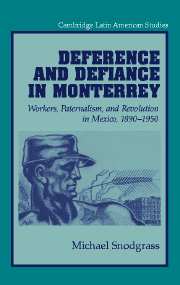Book contents
- Frontmatter
- Contents
- Acknowledgments
- Introduction
- 1 Porfirian Progress in “Mexico's Chicago”
- 2 Revolution Comes to Monterrey
- 3 Work, Gender, and Paternalism at the Cuauhtémoc Brewery
- 4 Making Steel and Forging Men at the Fundidora
- 5 The Democratic Principles of Our Revolution: Labor Movements and Labor Law in the 1920s
- 6 Every Class Has Its Leaders: ASARCO, The Great Depression, and Popular Protest in Monterrey
- 7 Stay with the Company or Go with the Reds
- 8 State Your Position!: Conservatives, Communists, and Cardenismo
- 9 The Quotas of Power: Organized Labor and the Politics of Consensus
- 10 The Persistence of Paternalism
- 11 The Institutionalized Revolution
- Select Bibliography of Primary Sources
- Index
1 - Porfirian Progress in “Mexico's Chicago”
Published online by Cambridge University Press: 19 August 2009
- Frontmatter
- Contents
- Acknowledgments
- Introduction
- 1 Porfirian Progress in “Mexico's Chicago”
- 2 Revolution Comes to Monterrey
- 3 Work, Gender, and Paternalism at the Cuauhtémoc Brewery
- 4 Making Steel and Forging Men at the Fundidora
- 5 The Democratic Principles of Our Revolution: Labor Movements and Labor Law in the 1920s
- 6 Every Class Has Its Leaders: ASARCO, The Great Depression, and Popular Protest in Monterrey
- 7 Stay with the Company or Go with the Reds
- 8 State Your Position!: Conservatives, Communists, and Cardenismo
- 9 The Quotas of Power: Organized Labor and the Politics of Consensus
- 10 The Persistence of Paternalism
- 11 The Institutionalized Revolution
- Select Bibliography of Primary Sources
- Index
Summary
When General Porfirio Díaz became president in 1876, Monterrey was a city of merchant houses and workshops servicing northeastern Mexico's mining and agricultural economy. By 1910, when revolution forced the elderly dictator into exile, Monterrey had emerged as the nation's preeminent industrial center, “Mexico's Chicago.” Monterrey symbolized and exemplified the Porfirian dream of industrial modernity. The Mexican people had accepted Don Porfirio's dictatorship as the price for peace. Union and Progress became the hallmark slogans of a regime that parlayed political stability and social order into economic development. Courted by the state, foreign investors financed railroads, factories, a mining revival, and oil exploration. The railroads spurred commercial agriculture, and a land grab ensued. Displaced peasants became rural laborers or rode the rails to find work in fast-growing industrial cities like Monterrey. By 1910, the capital of Nuevo León was the transportation hub of northern Mexico, the region that benefitted most from economic modernization. The railroads helped transform the frontier trading post into a modern city of banks, commerce, and industry. But Porfirian Progress carried a heavy and unacceptable price for the people of Mexico. As Don Porifirio grew old and his regime more repressive, a younger generation clamored for honest elections, workers agitated for industrial democracy, and peasants struggled for the restitution of lands. The wedding of those diverse grievances and social actors prompted the 1910 revolution that drew the old regime to a close.
- Type
- Chapter
- Information
- Deference and Defiance in MonterreyWorkers, Paternalism, and Revolution in Mexico, 1890–1950, pp. 8 - 30Publisher: Cambridge University PressPrint publication year: 2003



